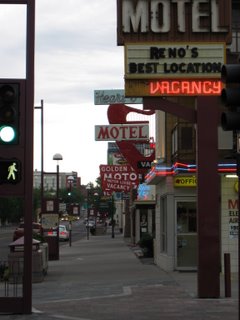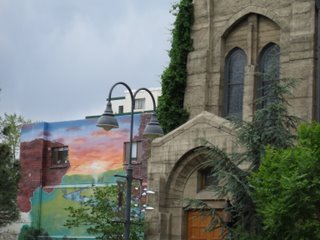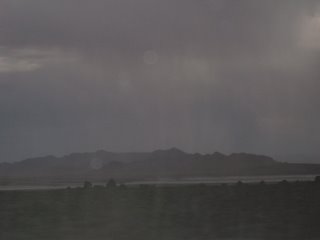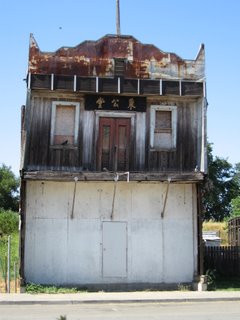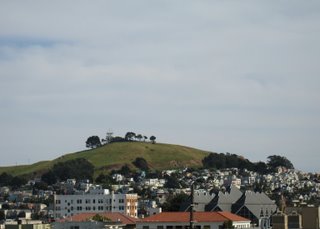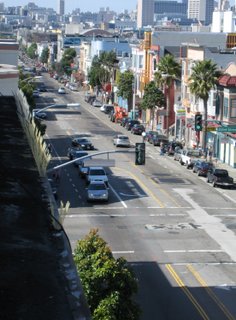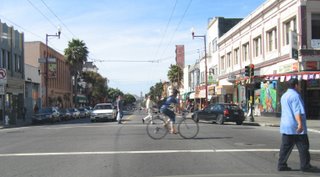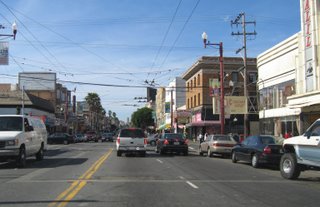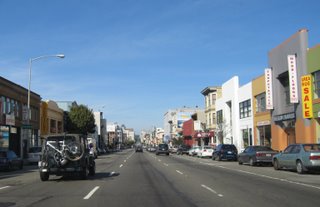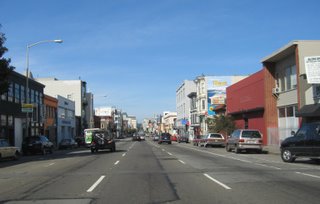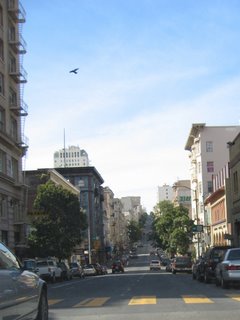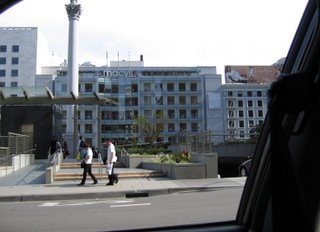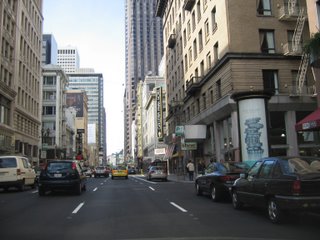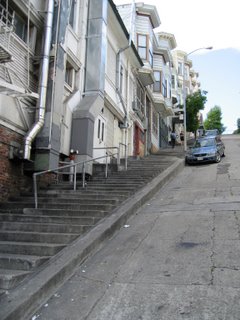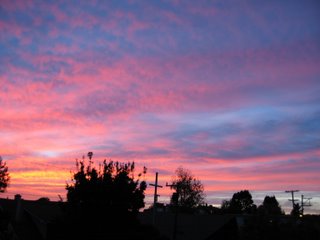On one hand, taking this picture could be symptom of silly fandom. On the other hand, it really is completely awesome. So awesome, in fact, that I made it my profile picture to the left.
As promised long ago, a picture of me and Aimee Bender at the Make Out Room in San Francisco.
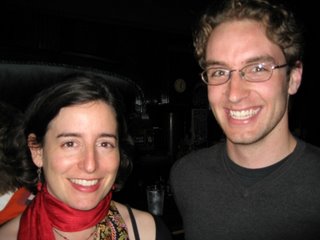
Last Monday night was the second installment of the Progressive Reading Series, which is an benefit for LitPAC, Stephen Elliott's political action committee. When you try to enter the bar, a cadre of LitPACers stop you and make you fill out a form: The admissions fee is a political donation, apparently. LitPAC, it turns out, raises money for Congressional candidates like Zach Space and Nick Lampson, the latter of whom is running for Congress in Tom DeLay's (former) district.
I've gone for the past two months, and the lineups have been stellar both times. April was
ZZ Packer,
Peter Orner,
Daniel Alarcon,
Po Bronson,
and Stephen Elliott. This month was
Pam Houston,
Steve Almond,
Peter Rock,
someone I can't recall (sorry!), and Aimee Bender. Both readings were packed.
Seeing so many people at readings is heartening for me, especially because I haven't seen any "name" writers at them, no David Foster Wallace or Chuck Palahniuk or Neil Gaiman types, writers who have cults and will bring out a crowd wherever they go.1 Most lit readings are lucky to get 20 people, and it often feels that writers or aspiring writers comprise much of the audience. This insularity worries many, and is one of the reasons that literature is widely understood to be in decline.
But literary fiction has always been "in decline." When I was taking Latin, I remember a teacher of mine quoting an ancient that everything worthwhile had already been written, and was in the Library of Alexandria. (Google is failing me, but I'll work on the citation nonetheless.) I've heard it since then, as well, often coupled with a lament that no one reads anymore, literary novels don't sell, and so on and so on and so on.
I disagree with the "nothing left to write" camp—in brief, I feel that they are absurdly reductionist—but I do not otherwise dispute the facts. Literature has been trending toward cultural irrelevance for decades. Entertainment comes in other forms; news comes in other forms. But the internet has made writers——content producers, in internet-speak——important again. Let me put it this way: Because of the internet, writing, in all its forms, is now more important than television.
The business of writing books
Writing literature is, of course, a business. Writers may love the work they do, but they shouldn't have to do it for free. To my mind, then, we need to find novel ways to make money doing what we love.
Writers tend to be artistic types, and artistic types tend to shy away from business. There are many exceptions, of course—as I recall, Carver was an oilman and Wallace Stevens was in insurance—but looking at writing as a commercial product still seems anathema to many of the writers I know. How can you commercialize art? they ask.
The answer, I think, is not in the product, but in the delivery. I believe in the Long Tail, which proposes, in short, that profits from every niche product collectively outweigh profits from popular, blockbuster products. It's a complex and interesting idea. Literature is a niche market, and will continue to be a niche market, but some people want to buy books that are good and different from what everyone else is reading.
What are the economics of being a writer right now? For the most part, it involves a day job. Office work, temping, publishing, editing, teaching: All of these are jobs that are not writing. Even journalism or magazines, for a novelist, can be a day job. If you are working for someone else, you are not working for yourself. Period. Sometimes this is okay, but sometimes it is detrimental, and in any case writers should have the opportunity to make a career from writing and writing alone.
I therefore propose that writing full-time is a better career for a writer than not writing full-time.
Readings like this are a great beginning. Publishing, like the music industry, is based on a boom-or-bust model right now; unlike the music industry, I think there is still money to be made for publishers. But literature doesn't really have booms, and the literary equivalent of James Patterson or John Grisham or Michael Crichton is who? Toni Morrison? Normal Mailer? Jeffrey Eugenides?
Furthermore, writers aren't publishers. What is good for writers may be different from what is good for publishers. Publishers make balance-sheet decisions about authors on a regular basis, as part of normal operations, and authors should not believe otherwise.
Perhaps, then, the business model of being a writer should be changed. With the Progressive Reading Series, I think that we've stumbled upon the literature-as-indie-rock model. Writers with Drinks is similar to the Progressive Reading Series in this regard.
The music industry, widely construed, has many similarities to publishing. Most importanly, there is no lack in demand for content for either, simply lacks in demand for older, and often outdated, delivery of that content. People still listen to music, and they certainly read.
For those that can get by as musicians, how do they do it? For the most part, it is not with album sales, as Steve Albini made clear in his influential article. Instead, musicians make their living via performance; for the musician, the album is actually something of a loss leader, designed to attract and maintain interest among those fans who would and do pay to see a live concert.
But musicians also have a vested interest in putting out great albums, beyond creating a lifelong audience/revenue stream. Albums are how musicians are remembered, how greatness is achieved. Authors, especially those writing literature, could adopt this model closely.
It's not going to be for every writer, and it doesn't have to. But a lineup of writers packed the Makeout Room in San Francisco twice, at $10-20 a pop. So why not see this as a sign that you can make money doing readings? For minor writers it will be a reading before your girlfriend and her parents, but so what? Starting out in a band is the same way.
Don't misunderstand: these performances are not really about performance. Instead, they are a chance for the people who admire you and your work to come out and meet you. It's about developing a way for people to get close to literature again, by making writers eminently accessible. Aloofness and solitude work for Pynchon and Salinger, but those two are great exceptions.
Yes, what I'm proposing means that writers have to be nice. But if you're trying to sell books, why wouldn't you be nice to the people buying them? If you want to be recognized as the greatest writer since Nabokov, make it enjoyable for your readers to buy your books for their friends, and get them signed, and have their friends come to meet you.
Oh, and as long as we're on the indie-rock model, bring merch. When I meet a someone wearing a Marilynne Robinson t-shirt or a Gary Shteyngart bra, I'll know it's someone special.
1
All the writers I listed, I think, have similar fan bases—mostly male, white, educated, often science-y. Malcolm Gladwell has a different audience, and could probably bring 100 people out most places, but in trying to think of writers who could bring out 100 people anywhere in the country, I come up with very few names.

